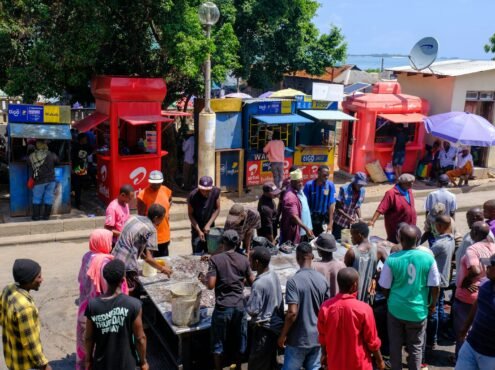WordPress Website Migration in Kenya
- Delivery Time2 Weeks
- English levelProfessional
- LocationUSA, United Kingdom, United Arab Emirates, Nairobi, Kilimani, Kenya, Dubai, CBD Nairobi, Canada, Australia
Service Description
The cost WordPress Website Migration in Kenya is 15000KES.Get WordPress Website Migration in Kenya at a price of 14000KES at Black Shepherd Technologies.
Seamless WordPress website migration in Kenya. Migrate your WordPress site with zero downtime and full SEO preservation. Discover DIY plugins or choose expert migration services for a hassle-free, secure, and fast transfer to better hosting. Improve your website’s performance and reliability today.
WordPress website migration in Kenya is a process that involves moving a WordPress site from one hosting environment or domain to another. This can be a complex task, but it is often necessary to improve a website’s performance, security, and reliability. Common reasons for migration include upgrading to a more powerful hosting provider, consolidating multiple websites, or moving from a non-WordPress platform to WordPress.
The migration process can be approached in two primary ways: a do-it-yourself (DIY) approach or hiring a professional service. The DIY method typically involves using a migration plugin like All-in-One WP Migration or Duplicator. These plugins simplify the process by packaging the entire site—including the database, files, themes, and plugins—into a single file that can be easily imported to the new location. However, this method requires some technical knowledge and care to ensure all data is transferred correctly and there is no loss of content or broken links. It’s crucial to perform a full backup before starting and to keep the original site live until the new one is fully operational.
For those who are not technically inclined or have a large, complex website, hiring a professional website migration service in Kenya is a popular and stress-free option. Many web hosting companies in Kenya, like Hostraha, Hostnali, and Softlink Options, offer free or affordable migration services as an incentive to switch to their platforms. These services are often handled by experienced technical teams who guarantee zero downtime and ensure all aspects of the site, from files to database configurations and SEO settings, are transferred seamlessly. Professional services also provide post-migration checks and support to ensure the website is functioning optimally on the new server.
The cost of WordPress migration in Kenya varies. While some hosting providers offer it for free with a hosting plan, professional migration services can have a separate fee, depending on the complexity of the website and the amount of data. The price of a hosting plan itself can range from a few hundred to several thousand Kenyan Shillings per month, depending on the features and resources required. When choosing a new host, it is important to consider factors like server location (for optimal performance in Kenya), uptime guarantees, customer support, and security features.
A successful migration in Kenya should result in a faster, more reliable, and more secure website. It’s an opportunity to upgrade the online foundation of a business or personal brand, setting the stage for future growth and a better user experience.Beyond the basic mechanics, a successful WordPress migration in Kenya is deeply connected to the country’s rapidly evolving digital landscape. Kenya’s ICT sector, often dubbed “Silicon Savannah,” has prioritized expanding digital infrastructure, which directly impacts the quality of hosting available. Government initiatives like the Digital Superhighway Project, aiming to lay an additional 100,000 kilometers of fiber optic cable, are significantly improving broadband speeds and internet penetration. This national focus creates a dynamic environment where website speed and reliability—key outcomes of a good migration—are becoming increasingly critical for online success.
Key Local Migration Considerations:
Server Location and Latency: While international hosting giants are an option, migrating to a web host with local Kenyan data centers (like Safaricom Web Hosting, HostPinnacle, or Truehost Cloud) can drastically reduce latency. For a website targeting a predominantly Kenyan audience, this local infrastructure can mean the difference between a sluggish site and a lightning-fast one, providing a crucial user experience advantage.
Hosting Options and Competition: The Kenyan web hosting market is highly competitive, offering various options from budget shared hosting to more powerful VPS (Virtual Private Server) and Managed WordPress Hosting. Providers like HostPinnacle, Truehost Cloud, and Novahost are consistently ranked highly, often engaging in price wars and offering competitive resource allocations (SSD storage, RAM, and CPU). When migrating, businesses should assess if a move from shared hosting to a more resource-rich VPS is warranted to handle projected traffic growth and ensure a high-performance environment.
The Manual Migration Process (Technical Detail): While plugins offer simplicity, a manual migration provides maximum control, which is often preferred for complex or e-commerce WordPress sites. The technical steps for a manual migration, regardless of the Kenyan host, follow a universal pattern:
Full Backup: Exporting the database (a .sql file) via phpMyAdmin and downloading all site files via FTP/SFTP (the wp-content, wp-admin, and wp-includes folders, plus root files like wp-config.php).
Preparation: Setting up the new hosting environment (installing a fresh WordPress instance is often unnecessary if transferring all files).
Transfer & Configuration: Uploading the site files, creating a new database on the new server’s cPanel/hPanel, importing the .sql file, and most importantly, updating the wp-config.php file with the new database credentials (DB_NAME, DB_USER, DB_PASSWORD, and DB_HOST).
URL Update: Using a database tool or a specialized plugin like Better Search Replace to update all old domain URLs in the database to the new ones, which is vital for permalinks and media links.
DNS Propagation: The final step involves updating the domain’s DNS records (Nameservers or A records) to point to the new host. This period, known as propagation, can take up to 48 hours, during which both the old and new sites may be accessible, necessitating a carefully timed launch to minimize disruption.
Choosing the right partner and understanding these technical steps is crucial for ensuring the migration supports Kenya’s digital economy trends, especially the growing demands of e-commerce and high-traffic platforms.








